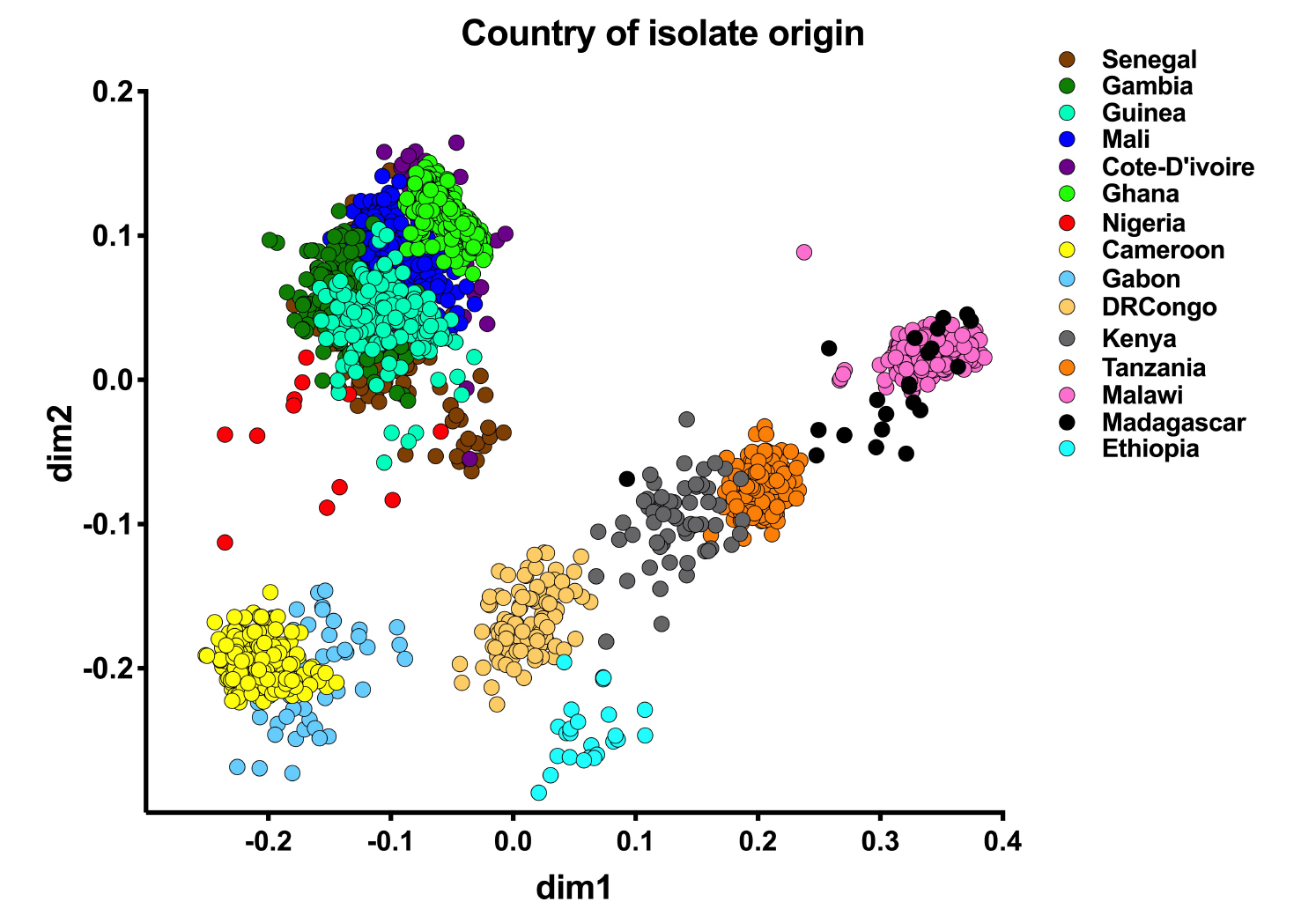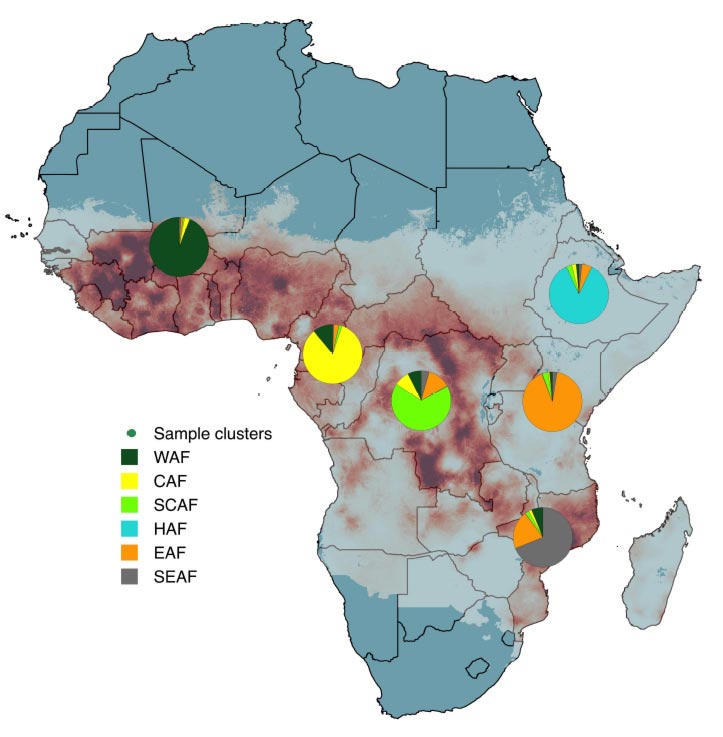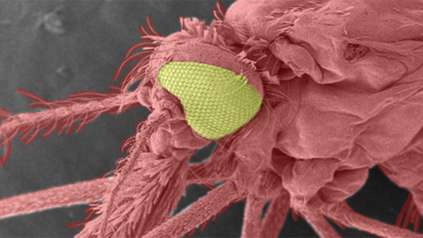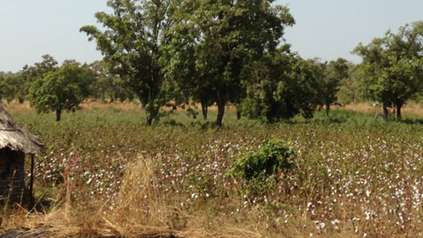Malaria control success in Africa at risk from spread of multi-drug resistance
In the first continent-wide genomic study of malaria parasites in Africa, scientists have uncovered the genetic features of Plasmodium falciparum parasites that inhabit different regions of the continent, including the genetic factors that confer resistance to anti-malarial drugs. This sheds new light on the way that drug resistance is emerging in different locations and moving by various routes across Africa, putting previous success in controlling malaria at risk.

The research, published today (22 August) in Science, comes from the first network of African scientists, the Plasmodium Diversity Network Africa (PDNA), to work with genomic tools to study the diversity of malaria parasites across the continent. In collaboration with the Wellcome Sanger Institute, the researchers studied the genetic diversity of P. falciparum populations endemic to several countries in sub-Saharan Africa, including Ethiopia and Ghana. Genomic surveillance data will help to track the emergence and spread of drug-resistant strains, assisting efforts to eliminate malaria.
Malaria remains a global problem, with the deadliest parasite species P. falciparum prevalent across sub-Saharan Africa. Between 2000 and 2015, an ongoing drive to eliminate the disease has seen worldwide malaria deaths halve from 864,000 to 429,000 per year. In 2015, 92 per cent of global malaria deaths were in Africa, with 74 per cent of these occurring in children under five years of age.* But the findings of a new study suggest this progress may be at risk if new forms of treatment aren’t developed.
Although the population of P. falciparum parasites in sub-Saharan Africa is extremely genetically diverse, previous research suggested that this diversity was relatively similar across the continent. It was also thought that the flow of genetic material tended to be from east to west, with resistance to antimalarial drugs believed to originate in South East Asia.
The results of this new study indicate, however, that P. falciparum parasites are genetically distinct according to which region of Africa they are found. Furthermore, researchers found that these regional populations are sharing genetic material in all directions – including genes that can confer resistance to antimalarial drugs, with new types of drug resistance emerging in different parts of Africa. It is thought human migration, including that resulting from colonial activity, has played a part in the evolution of P. falciparum in Africa.
Samples of P. falciparum were collected from 15 African countries by PDNA and their genomes sequenced at the Wellcome Sanger Institute as part of the MalariaGEN data-sharing network**. The genetic data on these samples, along with other African data that have previously been generated and openly released by MalariaGEN, were analysed to trace ancestral connectivity between the various parasite populations.
“Contrary to previous studies, we identified distinct Western, Central and Eastern populations of P. falciparum, as well as a highly-divergent Ethiopian population. Genetic material originating from all directions was shared by all populations, indicating that the flow of genes is multi-directional, as opposed to unidirectional from east to west as previously thought. This is crucial information for understanding how resistance to malaria drugs is developing in Africa.”
Professor Abdoulaye Djimdé Wellcome International Fellow at the Wellcome Sanger Institute and Chief of the Molecular Epidemiology and Drug Resistance Unit at the Malaria Research and Training Centre, University of Bamako

Researchers noted the fact that the Ethiopian parasite population is highly-differentiated from those in the rest of Africa, which suggested the ancestry of malaria parasites may have been influenced by human migration. The human population in Ethiopia also has a distinct ancestry to others in Africa, suggesting that the lack of colonization of the country might explain its outlier status. By contrast, parasites from distant former French colonies share genetic material.
The results confirmed that populations of P. falciparum have shared genetic information over time, particularly genes associated with resistance to antimalarial drugs.
Most concerningly, strong genetic signatures were detected on chromosome 12 in P. falciparum samples from Ghana and Malawi, raising the possibility that recent evolution of the parasite could compromise the effectiveness of artemisinin-based combination therapies (ACTs). ACTs combine multiple antimalarial drugs in one treatment to overcome resistance to one or more individual drugs.
“Whatever the historic factors affecting the flow of genes between the distinct P. falciparum populations, the multi-directional flow we’ve identified raises the prospect of continental spread of resistance to artemisinin-based combination therapies, which could arise from anywhere in Africa. Genomic surveillance, and on a large scale, is going to be vital to track the emergence and spread of resistance to combination therapies.”
Dr Alfred Amambua-Ngwa First author of the study, a Wellcome International Fellow at the Wellcome Sanger Institute and Assistant Professor at the Medical Research Council Unit The Gambia, London School of Hygiene and Tropical Medicine
The establishment of the PDNA is an important step in continuing to track the spread of drug-resistant malaria in Africa at a crucial time, when efforts to eliminate the disease are now stalling and the prospect of multi-drug resistant strains of P. falciparum in Africa on the horizon.
“Back in 2013, this impressive team of African scientists recognised the need to work together across the continent to monitor how this deadly malaria parasite is evolving. This has involved many practical and logistical challenges, and the team have done an amazing job in pulling together the most comprehensive genetic picture of the parasite population in different parts of Africa. It proves the feasibility of using modern genomic technologies to monitor malaria drug resistance in Africa, and it is now extremely important to ensure that the work is continued and used by policymakers and public health agencies to guide sustainable strategies for disease control.”
Professor Dominic Kwiatkowski Head of the Parasites and Microbes Programme at the Wellcome Sanger Institute, and Director of the MRC Centre for Genomics and Global Health
“This research could have implications for the future of malaria research and control in sub-Sahara Africa. By studying the genetic diversity of malaria across such a vast and diverse area, the research team have revealed the presence of key genetic differences within the malaria parasite P. falciparum strains across Africa.
“This could provide vital information into how drug-resistance is developing across the region and provides a stark reminder that the progress made in tackling malaria in sub-Sahara Africa is at risk of stalling unless we can develop new and effective treatments.”
Michael Chew Infection and Immunobiology Portfolio Manager at Wellcome
More information
*For more information on these figures and the state of malaria in general, see the WHO World Malaria Report 2016 https://www.who.int/malaria/media/world-malaria-report-2016/en/
**For more information on The Malaria Genomic Epidemiology Network (MalariaGEN), visit https://www.malariagen.net/about
Link to paper: https://science.sciencemag.org/cgi/doi/10.1126/science.aav5427
Funding:
This project was supported by the African Academy of Sciences (AAS), New Partnership for Africa’s Development Planning and Coordinating Agency (NEPAD Agency), and Wellcome. For full funding information, please refer to the full study.
Selected websites
MalariaGEN
This study formed part of the MalariaGEN Plasmodium falciparum Community Project. MalariaGEN is an international community of researchers working to understand how genetic variation in humans, Plasmodium parasites, and Anopheles mosquitoes affects the biology and epidemiology of malaria, and using this knowledge to develop more effective ways to control the disease. Find out more at https://www.malariagen.net/about
About MRC Unit The Gambia at LSHTM
The Medical Research Council Unit The Gambia at the London School of Hygiene and Tropical Medicine is one of the largest scientific research centres in sub-Saharan Africa, and for more than 70 years, has developed and maintained an international reputation for ground-breaking research into some of the leading causes of morbidity and mortality in the tropics, with an overall goal to improve the health of people in developing countries by aiming for excellence in research, healthcare and training. The Unit’s investigator-led research is underpinned by the combination of excellent laboratory facilities and easy access to the field with well-defined populations that are highly supportive of our research, excellent clinical services, rigorous ethical procedures and ability to deliver GCP-compliant clinical trials. Its large research portfolio spans basic research to the evaluation of interventions for the control of diseases of public health importance in sub-Saharan Africa. https://www.mrc.gm/about-us/
About the University of Science, Techniques and Technologies of Bamako, Mali
The Malaria Research and Training Center (MRTC) within the University of Science, Techniques and Technologies of Bamako, is a renowned African-led research institution which is divided into six research units, including the Genomics and Molecular Epidemiology Unit, B-cell Laboratory within Immunology Group, Cellular immunology laboratory within Immunology Group, Molecular Epidemiology and Drug Resistance Unit, Clinical Laboratory, Data Management and Analysis Group, and Diagnostic Laboratory. During the past 20 years, MRTC in collaboration with NIH, University of Maryland, EDCTP, Wellcome, African Academy of Sciences, WHO and others has built a state-of-the-art facility including parasite culture facilities, Insectaries, genomic data storage and Bioinformatics facilities. There are five established clinical trial sites for vaccine and seven for drug trials and epidemiological studies and numerous satellite field research sites.
About the MRC Centre for Genomics and Global Health
The MRC Centre of Genomics and Global Health, based at the Big Data Institute at the University of Oxford, works to integrate genomic and population genetic data with clinical and epidemiological data. Its primary goal is to develop innovative methods to monitor evolutionary changes in the pathogens that cause disease and the vectors that transmit them. The MRC Centre has provided core support for the Plasmodium Diversity Network Africa (PDNA) since its inception. https://www.cggh.org/
The Wellcome Sanger Institute
The Wellcome Sanger Institute is a world leading genomics research centre. We undertake large-scale research that forms the foundations of knowledge in biology and medicine. We are open and collaborative; our data, results, tools and technologies are shared across the globe to advance science. Our ambition is vast – we take on projects that are not possible anywhere else. We use the power of genome sequencing to understand and harness the information in DNA. Funded by Wellcome, we have the freedom and support to push the boundaries of genomics. Our findings are used to improve health and to understand life on Earth. Find out more at www.sanger.ac.uk or follow us on Twitter, Facebook, LinkedIn and on our Blog.
About Wellcome
Wellcome exists to improve health by helping great ideas to thrive. We support researchers, we take on big health challenges, we campaign for better science, and we help everyone get involved with science and health research. We are a politically and financially independent foundation. https://wellcome.org/





